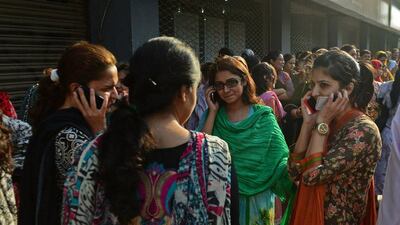KARACHI // The death toll from a powerful earthquake that struck a remote part of southwestern Pakistan rose to 210 officials said, as rescue teams rushed to the area.
The 7.7-magnitude quake hit the Awaran district of Baluchistan province on Tuesday afternoon, destroying scores of mud-built houses.
Abdul Latif Kakar, the head of the Provincial Disaster Management Authority, gave AFP the new toll and said there were more than 300 people injured.
A top local administration official in Awaran, Abdul Rasheed Baluch, confirmed the new toll and said many more deaths were feared as response teams worked through the day.
“We have been busy in rescue efforts for the whole night and fear we will recover more dead bodies from under the rubble during the daylight,” he said.
“Around 90 percent of houses in the district have been destroyed. Almost all the mud houses have collapsed.”
Some of the dead have already been laid to rest in their villages, he added.
Tremors were felt as far away as the UAE and New Delhi, where buildings shook. The quake was also felt in Pakistan’s largest city, Karachi, along the Arabian Sea.
Officials are also investigating whether the earthquake created a new island off the coast of Gwadar.
Baluchistan province is the country’s largest but also the least populated.
People in Karachi’s office buildings rushed into the streets following the tremor, and Pakistani television showed images of lights swaying as the ground moved.
“I was working on my computer in the office. Suddenly I felt tremors. My table and computer started shaking. I thought I am feeling dizziness but soon realised they were tremors,” said one Karachi resident, Mohammad Taimur.
TV footage showed residents in Quetta, the capital of Baluchistan, coming out of their homes and offices in a panic. One man told Pakistan’s Dunya television channel that he was sitting in his office when the building started shaking.
Other residents said people started reciting verses the Quran, when the quake began.
Light tremors were felt across the UAE. The National Centre for Meteorology and Seismology said the quakes were between 3.0 and 4.0 on the Richter Scale.
Pakistan’s Baluchistan province and neighbouring Iran are prone to earthquakes.
A magnitude 7.8, which was centred just across the border in Iran, killed at least 35 people in Pakistan last April.
In January 2011, a 7.2 magnitude quake damaged 200 mud-brick homes in a remote area of Baluchistan about 320 kilometres south-west of Quetta, not far from the Afghan border but caused no casualties.
* Agence France-Presse with additional reporting by Awad Mustafa and the Asscoiated Press

